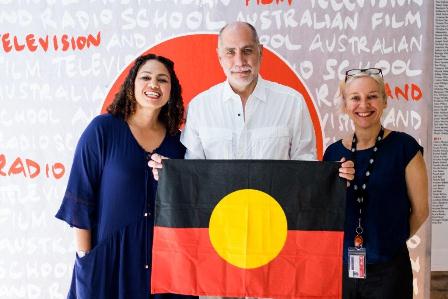Kyas Sherriff (Head of the Indigenous Unit) Guillermo Arriaga, Sue Elphinstone (Indigenous Unit Project Officer). Photographer: Graeme Taylor.
Last week AFTRS relaunched its Indigenous Unit with the first instalment of its Black Talk series.
The Unit’s new head, Kyas Sherriff, hosted a session with Mexican writer Guillermo Arriaga (Amores Perros, 21 Grams, Babel), in town as a guest of NITV.
Arriaga was in mischevious form, riffing for an hour on everything from his writing process, his fights with director Warwick Thornton, his creative divorce from Alejandro González Iñárritu, and the damage his “friend” Tarantino has had on cinema.
The screenwriter and novelist started the session off with a flourish, producing an aboriginal flag from his pocket and laying it in front of him, declaring “I want to show my love”.
Arriaga was first brought to Australia by Sally Riley, who met Arriaga at the Sundance Labs the same year that Amores Perros bowed at the festival.
On that first trip Arriaga met the likes of Rachel Perkins and Wayne Blair, and “couldn’t believe the power and originality of indigenous filmmakers”.
Later he was invited to Uluru, where he met indigenous novelists such as Kim Scott, Bruce Pascoe and Tony Birch.
More recently Arriaga recruited Warwick Thornton to direct a section of his anthology film Words with Gods, shot in nine different countries.
Thornton’s short, filmed in Alice Springs, stars Miranda Tapsell (in attendance at the AFTRS talk) and is very different to the one Thornton originally proposed.
“He gave me a story about Christians in Australia”, Arriaga said. “I said – why white Christians? He said: ‘I’m not going to make something about exotic aboriginals’.
“If I wanted the exotic take”, said Arriaga, “I’d ask a white filmmaker, but I’m asking you. And he made a beautiful film”.
Asked about Iñárritu, with whom he made his name on Amores Perros and Babel, Arriaga said “it’s like making me talk about my ex-wife”.
“The work we did together is completely different to the work he’s doing now. It was a very nasty divorce, and he kept the house” (laughs)
“He got angry when somebody said he was directing my work. I’ve always resisted the film-by credit. I think it’s completely unfair”.
According to Arriaga, his writing is inspired by life and by reading, and “one is not better than the other”.
The frequent teacher spoke of visiting students in Texas, who regaled him with stories of hitmen and aliens abducting students – “for me, extremely bad stories”.
The personal is where the gold is, Arriaga said, but “most people don’t feel confident telling the stories they have”.
The writer told the assembled students that one of his favourite teaching methods is to ask pupils to write down their sexual fantasies.
“Students thought I was a dirty old man. No names, just put down your gender and your phone number” (laughs).
When Arriaga perused the results, ninety-five percent of men came up with a threesome – “if your fantasies are such a cliche, think what you’re fighting in your writing”.
The screenwriter ran a good line in throwaway aphorisms throughout the lunchtime talk.
“Faulkner said he wrote about his neighbours because he wanted to be universal” was one.
“My rule is: conciliate, never concede” was another.
Perhaps the best was “People buy what you sell. Would you offer a rom-com to Sean Penn? No way, because Sean Penn has sold himself as a certain kind of actor”.
Arriaga’s attitude to “artificial structures” in screenwriting, he said, is that they are just that: “I’ve never heard anybody in real life tell stories in a linear fashion”.
“I never research. I’m too lazy. I wrote a film [Babel] that takes place in Morocco and Japan. I’ve never been to Morocco and Japan. That doesn’t mean I’m right. It’s just one way of approaching the work. I admire Peter Morgan [The Queen, Frost/Nixon, Rush] a lot, and of course he researches very much”.
“My way of getting details is by using my own experience”, Arriaga said.
“My work is to seduce. I need to seduce people [with the screenplay], because that’s how you get people onboard. I’m amazed by how people write ugly in screenplays”.
Ever the showman, Arriaga asked the assembled crowd to examine their hands before telling them: “There’s a moment when they are going to stop moving. So what are you doing with them”?
“Kafka said: ‘writing is a fight against death’. On December 31, I was writing. On December 24, I was writing. 14-16 hour days, because writing is my fight against death”.
“I never write an outline. Too boring. I never know how my story is going to end. Too boring”.
“I cannot write thinking of the audience, because I’d go crazy”.
“I have a very vague idea what it’s going to be about. I sit down and write, and rewrite a lot. I try to have rigour, by which I mean I question my decisions. If my lead is a 30 year-old man, what would happen if he was a 40 year-old woman instead?”
“Once I finish, I rewrite the screenplay but change the characters. Sometimes I rip out the first twelve pages – how does it work? I do these drastic things”.
“I think dialogue more than two lines, unless you’re a genius, is going to be bad”.
Arriaga was at the Venice Film Festival in 2010, serving on a jury presided over by Quentin Tarantino.
“I said to Quentin at Venice, ‘man, you did so much damage to cinema, because now people want to write about Big Macs but don’t have your talent’.
For his own part, Arriaga tries “to make scenes less than one page”.
An avid hunter with bow and arrow, Arriaga told the AFTRS crowd that watching animals, one realises that “so much of that behaviour is still in us. We’re all sitting on a throne of blood. Even Vegans”.


